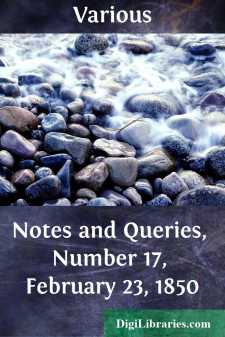Categories
- Antiques & Collectibles 13
- Architecture 36
- Art 48
- Bibles 22
- Biography & Autobiography 813
- Body, Mind & Spirit 142
- Business & Economics 28
- Children's Books 17
- Children's Fiction 14
- Computers 4
- Cooking 94
- Crafts & Hobbies 4
- Drama 346
- Education 46
- Family & Relationships 57
- Fiction 11829
- Games 19
- Gardening 17
- Health & Fitness 34
- History 1377
- House & Home 1
- Humor 147
- Juvenile Fiction 1873
- Juvenile Nonfiction 202
- Language Arts & Disciplines 88
- Law 16
- Literary Collections 686
- Literary Criticism 179
- Mathematics 13
- Medical 41
- Music 40
- Nature 179
- Non-Classifiable 1768
- Performing Arts 7
- Periodicals 1453
- Philosophy 64
- Photography 2
- Poetry 896
- Political Science 203
- Psychology 42
- Reference 154
- Religion 513
- Science 126
- Self-Help 84
- Social Science 81
- Sports & Recreation 34
- Study Aids 3
- Technology & Engineering 59
- Transportation 23
- Travel 463
- True Crime 29
Notes and Queries, Number 17, February 23, 1850
by: Various
Categories:
Description:
Excerpt
KING ALFRED'S GEOGRAPHY OF EUROPE.
The sketch of Europe, which our illustrious Alfred has inserted in his translation of Orosius, is justly considered, both here and on the Continent, as a valuable fragment of antiquity; and I am sorry that I can commend little more than the pains taken by his translators, the celebrated Daines Barrington and Dr. Ingram, to make it available to ordinary readers. The learned judge had very good intentions, but his knowledge of Anglo-Saxon was not equal to the task. Dr. Ingram professedly applied himself to correct both Alfred's text and Barrington's version, so far as relates to the description of Europe; but in two instances, occurring in one passage, he has adopted the judge's mistake of proper names for common nouns. I do not call attention to the circumstance merely as a literary curiosity, but to preserve the royal geographer from liability to imputations of extraordinary ignorance of his subject, and also to show the accuracy of his delineation of Europe at that interesting epoch, whence the principal states of Europe must date their establishment.
King Alfred, mentioning the seat of the Obotriti, or Obotritæ, as they are sometimes named, a Venedic nation, who, in the 9th century, occupied what is now the duchy of Mecklenburg, calls them Apdrede, and says—"Be nor than him is apdrede, and cast north wylte the man æfeldan hæt."
Barrington translates the words thus:—"To the north is Aprede, and to the north east the wolds which are called Æfeldan."
Dr. Ingram has the following variation:—"And to the east north are the wolds which are called Heath Wolds." To the word wolds he appends a note:—"Wylte. See on this word a note hereafter." Very well; the promised note is to justify the metamorphosis of the warlike tribe, known in the annals and chronicles of the 9th century as the Wilti, Wilzi, Weleti, and Welatibi, into heaths and wolds. Thirty pages further on there is a note by J. Reinhold Forster, the naturalist and navigator, who wrote it for Barrington in full confidence that the translation was correct:—"The Æfeldan," he says, "are, as king Alfred calls them, wolds; there are at present in the middle part of Jutland, large tracts of high moors, covered with heath only."
Of wylte, Dr. Ingram writes:—"This word has never been correctly explained; its original signification is the same, whether written felds, fields, velts, welds, wilds, wylte, wealds, walds, walz, wolds, &c. &c." And on heath, he says:—"Mr. Forster seems to have read Hæfeldan (or Hæthfeldan), which indeed, I find in the Junian MS. inserted as a various reading by Dr. Marshall (MSS. Jun. 15.). It also occurs, further on in the MS., without any various reading. I have therefore inserted it in the text."
Dr. Marshall seems to have understood the passage. What King Alfred says and means is this:—"On the north are the Apdrede (Obotritæ), and on the north east of them are the Wylte, who are called Hæfeldi."
The anonymous Saxon Poet, who wrote the life of Charlemagne, gives the same situation as Alfred to the Wilti:—
"Gens est Slavorum Wilti cognomine dicta,
Proxima litoribus quæ possidet arva supremis
Jungit ubi oceano proprios Germania fines."
Helmold says that they inhabited the part of the coast opposite to the island of Rugen; and hereabouts Adam of Bremen places the Heveldi, and many other Slavonic tribes. I am not aware that any other author than Alfred says, that the Wilti and Heveldi were the same people; but the fact is probable....












